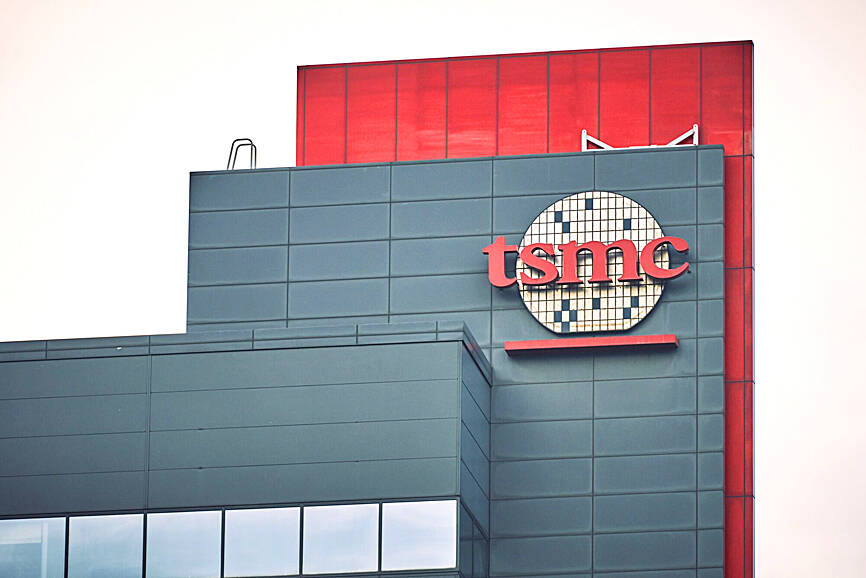Taiwan Semiconductor Manufacturing Co (TSMC, 台積電), yesterday said it has signed an agreement with Innolux Corp (群創) to acquire the flat-panel display maker’s plant in Tainan for NT$17.14 billion (US$530.6 million) amid supply constraints of its advanced packaging capacity constraints.
TSMC plans to use the plant, including buildings and manufacturing facilities, for future operations, the world’s biggest foundry service provider said in a filing with the Taiwan Stock Exchange.
The chipmaker did not elaborate on whether it would convert the plant into a new panel-level packaging factory, or expand its advanced packaging chip-on-wafer-on-substrate (CoWoS) capacity.

Photo: An Rong Xu, Bloomberg
The chipmaker "is working whatever it can" to more than double CoWoS capacity this year and next year in order to solve a severe shortage on strong artificial-intelligence (AI) chip demand, TSMC chairman C.C. Wei (魏哲家) told investors in June.
Innolux shut down the 5.5-generation plant last year after losing its competitive edge in producing cost-effective flat-panel displays.
The company now focuses on rejuvenating its existing facilities and works to diversify into new businesses including chip packaging. Its strategy is to transform itself into a company with two major revenue sources — display and non-display.
The deal with TSMC would allow Taiwan to play a crucial role in the global technology sector and economy, Innolux said yesterday.
Earlier this month, Innolux chairman Jim Hung (洪進揚) told investors that the company expected the asset disposal to bring new business opportunities and form partnerships to enhance its technological capabilities.
Innolux has already built fan-out panel-level packaging (PLP) capacity by converting a less-advanced 3.5-generation plant into one which would provide entry-level chip packaging services for power management chips and radio frequency chips.
The company intends to collaborate with major foundry service providers to advance its chip packaging technology as it looks to pursue opportunities stemming from the AI business, Innolux president James Yang (楊柱祥) said earlier this month.
Innolux expects the new chip packaging business to contribute significant revenue in the first quarter of next year.

In Italy’s storied gold-making hubs, jewelers are reworking their designs to trim gold content as they race to blunt the effect of record prices and appeal to shoppers watching their budgets. Gold prices hit a record high on Thursday, surging near US$5,600 an ounce, more than double a year ago as geopolitical concerns and jitters over trade pushed investors toward the safe-haven asset. The rally is putting undue pressure on small artisans as they face mounting demands from customers, including international brands, to produce cheaper items, from signature pieces to wedding rings, according to interviews with four independent jewelers in Italy’s main

Macronix International Co (旺宏), the world’s biggest NOR flash memory supplier, yesterday said it would spend NT$22 billion (US$699.1 million) on capacity expansion this year to increase its production of mid-to-low-density memory chips as the world’s major memorychip suppliers are phasing out the market. The company said its planned capital expenditures are about 11 times higher than the NT$1.8 billion it spent on new facilities and equipment last year. A majority of this year’s outlay would be allocated to step up capacity of multi-level cell (MLC) NAND flash memory chips, which are used in embedded multimedia cards (eMMC), a managed

Japanese Prime Minister Sanae Takaichi has talked up the benefits of a weaker yen in a campaign speech, adopting a tone at odds with her finance ministry, which has refused to rule out any options to counter excessive foreign exchange volatility. Takaichi later softened her stance, saying she did not have a preference for the yen’s direction. “People say the weak yen is bad right now, but for export industries, it’s a major opportunity,” Takaichi said on Saturday at a rally for Liberal Democratic Party candidate Daishiro Yamagiwa in Kanagawa Prefecture ahead of a snap election on Sunday. “Whether it’s selling food or

In the wake of strong global demand for AI applications, Taiwan’s export-oriented economy accelerated with the composite index of economic indicators flashing the first “red” light in December for one year, indicating the economy is in booming mode, the National Development Council (NDC) said yesterday. Moreover, the index of leading indicators, which gauges the potential state of the economy over the next six months, also moved higher in December amid growing optimism over the outlook, the NDC said. In December, the index of economic indicators rose one point from a month earlier to 38, at the lower end of the “red” light.